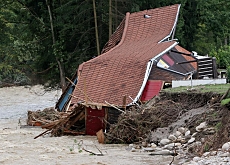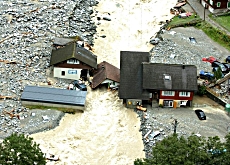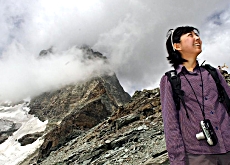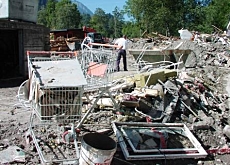Disaster insurance coverage expected to rise

Swiss insurers are planning to raise payout levels for property damage from natural disasters to up SFr2 billion ($1.62 billion) following huge floods last summer.
But the fourfold increase of the maximum payout would lead to higher premiums.
The move was prompted by devastating floods that hit several Swiss cantons last August and led to private insurance claims totalling SFr1.3 billion.
“Last year’s events proved the payout limit was too low,” said Beat Krieger on Tuesday. The spokesman for the Swiss Insurance Association (SIA) said the industry expected similar damage to be caused by natural disasters in future.
According to current Swiss law, insurers are only required to pay out a maximum of SFr500 million. The planned increase of coverage, according to the SIA, will ensure that premium holders are “completely indemnified even if they suffer the worst kind of natural catastrophe”.
Many insurers met claims above that level after the 2005 floods, which led to SFr2.5 billion Swiss francs in overall losses.
Premiums will increase slightly if the insurers’ proposal is finalised. But minimum payout levels will jump fivefold in some cases.
The deductible rate of premiums for private belongings would rise from SFr200 to SFr500. For homes and agricultural buildings, the minimum payout level would be SFr10,000 instead of SFr2,000.
The SIA said last year’s flooding was not the only reason for the decision to increase levels, adding that with climate change underway, natural catastrophes were becoming more frequent. The association also warned that more buildings were also going up in risk zones.
The government is debating whether to raise the maximum threshold to ensure sufficient payouts should a similar disaster occur. A decision, which will effectively approve the insurance industry’s move as well as the higher premiums, is expected in October.
Risk reduction
Private insurers have warned that the planned increases are not sufficient. They called on the authorities to do everything to reduce the risk of natural catastrophes in the long term through better planning, hazard maps and prevention measures.
Immediately after last year’s floods, several cantons started building dams and dredging rivers, and reviewed earlier plans aimed at implementing effective controls.
They also speeded up work on completing the country’s hazard maps, which show areas at risk of flooding, rockslides and avalanches. The Federal Office for Water and Geology also promised to upgrade its early warning system.
Experts have said that the federal and cantonal authorities will have to spend billions of francs over the next few years if they want to prevent further catastrophic flooding.
Three days of torrential rain led to last year’s flooding and landslides. About two-thirds of Switzerland’s 26 cantons reported damage. Hardest hit was canton Bern and those in central Switzerland, with a total of six people dying.
Two people were killed when the mountain stream running through the village of Brienz in the Bernese Alps spilled over its banks, destroying several houses. A landslide swept two firemen to their deaths in the canton Lucerne countryside.
Roads and railway lines that were washed away cut off villages for days, and for weeks in the case of the mountain resort of Engelberg.
swissinfo with agencies
A federal hydraulic engineering law was passed in 1991 demanding the introduction of measures to prevent flooding.
The 15-year-old law states cantons are to do whatever is necessary to protect their communities, including the widening of riverbeds and the building of dams and reservoirs.
It adds that wherever possible, natural river courses should be maintained or reinstated to the way they once were.

In compliance with the JTI standards
More: SWI swissinfo.ch certified by the Journalism Trust Initiative




You can find an overview of ongoing debates with our journalists here . Please join us!
If you want to start a conversation about a topic raised in this article or want to report factual errors, email us at english@swissinfo.ch.